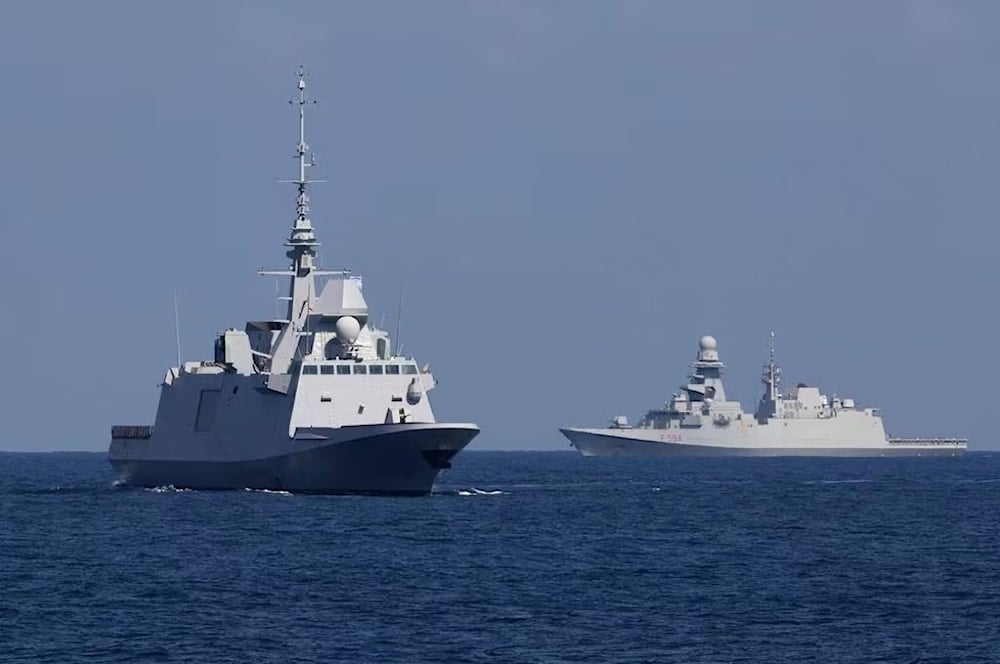France abstains from supporting US-UK aggression on Yemen
Despite being part of the Prosperity Guardian mission, France's current mandate excludes direct strikes against the Yemeni resistance.
-

The French frigate Languedoc, now on duty in the Red Sea, and Italian frigate Alpino (R) perform maneuvers during the "Noble Dina 23" multilateral exercise in the Mediterranean Sea on March 27, 2023 (Photo by Jack Guez/AFP)
France refrained from signing a statement in support of US and UK airstrikes on the Yemeni resistance, citing its decision not to partake in bombing raids to protect Red Sea shipping, The Telegraph reported on Friday.
This comes after the US and the UK waged multiple aggressions on Yemeni positions along the Yemeni coastline, in an effort to re-open the crucial maritime route that the Ansar Allah movement has been blocking to force the Israeli regime to halt its genocidal campaign on the people of Gaza.
Since November 2023, the Yemeni resistance has been waging operations targeting Israel-linked vessels in the Red Sea to prevent shipments from reaching the occupied territories. In response to this, the US formed a naval coalition to thwart the resistance.
Read more: Blinken fails to convince Arab states to join US-led op. in Red Sea
While several nations, including Germany, Denmark, Australia, Canada, and others, supported last night's airstrikes and warned of potential further action, France, Italy, and Spain declined military or political support.
France, focusing on diplomatic efforts to ease tensions between Hezbollah and "Israel", expressed concerns that participating in the strikes would compromise its leverage.
Despite being part of the Prosperity Guardian mission, France's current mandate excludes direct strikes against the Yemeni resistance.
The French foreign ministry, in response to the Yemeni operations on Israeli-linked ships, condemned the actions and asserted that states have the right, in accordance with international law, to react to such attacks.
"Through these armed actions, the Houthis bear an extremely heavy responsibility for the regional escalation," a spokesman said.
"France will continue to assume its responsibilities and contribute to maritime security in this zone in conjunction with its partners, as it was called upon to do on 9 and 11 December last year when the frigate Languedoc was called upon to destroy drones," they added.
Julien Barnes-Dacey, the director of the Middle East and North Africa program at the European Council on Foreign Relations think tank, mentioned that France aims to maintain a "degree of distance" from US-led operations in the region.
According to him, this approach is intended to "preserve some space to play a mediating role with Iran and its allies, which has been a consistent feature of Macron’s regional agenda."
He added that "the French fear getting pulled into American-Iran polarization and conflict, which would reduce their own space for influence."
"We also saw this in recent years when Paris didn’t join the US-led naval operation in the Persian Gulf and instead pushed a more inclusive European-led effort."
Read more: EU to discuss plan for yet another naval mission in the Red Sea
Italy clarified that it was not asked to participate in the Anglo-American attacks on Thursday night. Prime Minister Giorgia Meloni's government asserted that even if a request had been made, it would have necessitated a parliamentary debate for military authorization.
Deputy Prime Minister Mr Tajani mentioned that Italy's constitution prohibits committing acts of war without parliamentary discussion. Despite reports suggesting Rome was asked to participate, it reportedly declined, favoring a "calming policy."
Spain, under Prime Minister Pedro Sánchez's Left-wing government, has no plans to join any mission in thwarting Yemeni operations in the Red Sea.
The Spanish government appears to distance itself from Washington's approach, avoiding involvement in displays of strength against the resistance while denying any rift with the US. However, signs of tension between Madrid and Washington have emerged.

 4 Min Read
4 Min Read








